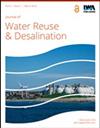Public perceptions and perspectives on alternative sources of water for reuse generated at the household level
IF 2.3
Q2 Environmental Science
引用次数: 9
Abstract
Studying perceptions about reuse of alternative water sources informs about conditions necessary for transition to large-scale decentralized water reuse. We administered a perceptions survey to the public based on results of initial open interviews of water management experts in Israel. Experts indicated their views on impediments to widespread household water reuse which became the basis for developing the questionnaire. The latter aimed to understand views among the general public of: (a) willingness to adopt reuse practices from three sources: greywater, air conditioner condensate and roof-harvested rainwater; and (b) preferences for targeted use of these three types of reused water. The survey elicited 372 responses. A maximum-likelihood regression analysis was conducted using independent variables (i.e., demographic characteristics, individual positions regarding the state of the country's water resources and plans for the provision of domestic water (i.e., desalination), knowledge of the reuse practices and views about risks from various uses of the reused water, including off-premise). Willingness to implement reuse practices served as the dependent variable. We found that respondents indicating that they heard of the reuse of the particular types of reuse practices (variable: ‘Knowledge’) was the most significant of the independent variables for all three alternative water sources. Also, using an analytic hierarchy process, we determined that health risks were much more important when compared to convenience of use and costs under hypothetical scenarios of both moderate and significant savings in monthly water expenditures.公众对家庭一级可重复使用的其他水源的看法和看法
研究对替代水源再利用的认识,可以了解向大规模分散式水再利用过渡的必要条件。根据对以色列水管理专家的初步公开访谈结果,我们对公众进行了一项看法调查。专家们表明了他们对阻碍广泛使用家庭用水的障碍的看法,这成为编制调查表的基础。后者旨在了解公众对以下三个来源的意见:(a)是否愿意采用循环再用的做法:灰水、空调冷凝水和屋顶收集的雨水;(b)有针对性地使用这三种回用水的偏好。这项调查得到了372份回复。使用独立变量(即人口特征、关于国家水资源状况的个人立场和提供生活用水的计划(即海水淡化)、对再利用做法的了解以及对再利用水的各种用途(包括非室内使用)的风险的看法)进行了最大似然回归分析。实现重用实践的意愿充当了因变量。我们发现,受访者表示他们听说过特定类型的再利用实践(变量:“知识”)的再利用是所有三种替代水源的最重要的自变量。此外,使用层次分析法,我们确定,在每月水支出适度和显著节省的假设情景下,与使用的便利性和成本相比,健康风险更为重要。
本文章由计算机程序翻译,如有差异,请以英文原文为准。
求助全文
约1分钟内获得全文
求助全文
来源期刊

Journal of Water Reuse and Desalination
ENGINEERING, ENVIRONMENTAL-WATER RESOURCES
CiteScore
4.30
自引率
0.00%
发文量
23
审稿时长
16 weeks
期刊介绍:
Journal of Water Reuse and Desalination publishes refereed review articles, theoretical and experimental research papers, new findings and issues of unplanned and planned reuse. The journal welcomes contributions from developing and developed countries.
 求助内容:
求助内容: 应助结果提醒方式:
应助结果提醒方式:


